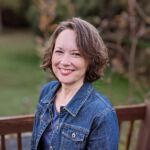At the age of six, I moved across an ocean to a then-unknown land, Ireland. I moved with my father, pregnant mother, and three-year-old sister to a country that spoke English but was foreign all the same. I loved growing up in Ireland; it was a beautiful gift. Yet, it wasn’t always an easy life.
Looking back now, it feels as if my entire childhood was a lesson in being brave. We settled into life in Ireland, then every four years, that life was interrupted by a return to America. A year-long trip traveling from home to home, church to church—a time to reconnect with old friends and make new friends. And always a new school to attend.
In her book, Rhythms of Renewal, Rebekah Lyons defined brave as moving scared. This definition describes how I lived my childhood.
You see, I was not a brave child. I was a very anxious child. I did not, still do not like change. I am a natural introvert who would rather spend hours alone in my room than surrounded by people in new places. Yet, the life God called my family to did not foster my natural tendencies. Instead, it taught me the ability to keep moving even when scared.
I tend to credit my fear of missing out on life for the ability to overcome my natural fear of life. When faced with a challenging, scary situation, I decided to push through it rather than hide, to take it on as a challenge. And while this has served me well for most of my life, there is a downside.
Inadvertently in my learning to be brave, I decided that brave meant doing things myself, in my strength. Brave meant being in control of the situation.
At the age of 18, I left home to attend college. It took two airplanes, a bus trip, a summer job, and a lot of brave before I arrived there. I had to say goodbye to family and friends at the airport. Twenty-eight years later, I still vividly remember that day. I can see my Dad as he attempts to help me get checked in. But, instead of letting him help, I took my ticket and said, “It’s ok, Dad, I’ve got this.” Emphasis on “I’ve got this.” A moto I traveled with for most of my adult life.
I didn’t realize that “I’ve got this” was code for taking control. My bravery was only as good as my ability to plan, organize, control, plan some more, and develop a new plan when life didn’t go as planned. My ability to be brave was dependent on “my ability.” Until eventually, “I’ve got this” became “I can’t do this.” At least, not alone in my strength.

It has taken me a lot of years to understand that it is not brave to hide behind independence and self-sufficiency. This is just fear in disguise. True bravery allows for weakness, community, vulnerability, and dependence. For it is true bravery that opens the door and allows others into our lives. It takes courage to admit, “I can’t do this alone.” It takes courage to ask for help. It takes courage to open ourselves to love deeply and risk our hearts.
Twenty-seven years later, and a lot of life, I am finally beginning to gain a new understanding of brave. Yes, brave is moving scared. It is courageous to move forward amid uncertainty. Yet, being brave is so much more.
Brave is living dependent.
Brave is living vulnerable and in community.
Brave is asking for help.
Brave is knowing when to say no.
Brave is opening your heart and your home.
Brave is recognizing that “I’ve not got this,” at least not in my strength, on my own.
Brave is letting go of the need to control.
Brave is moving forward, even when scared.





